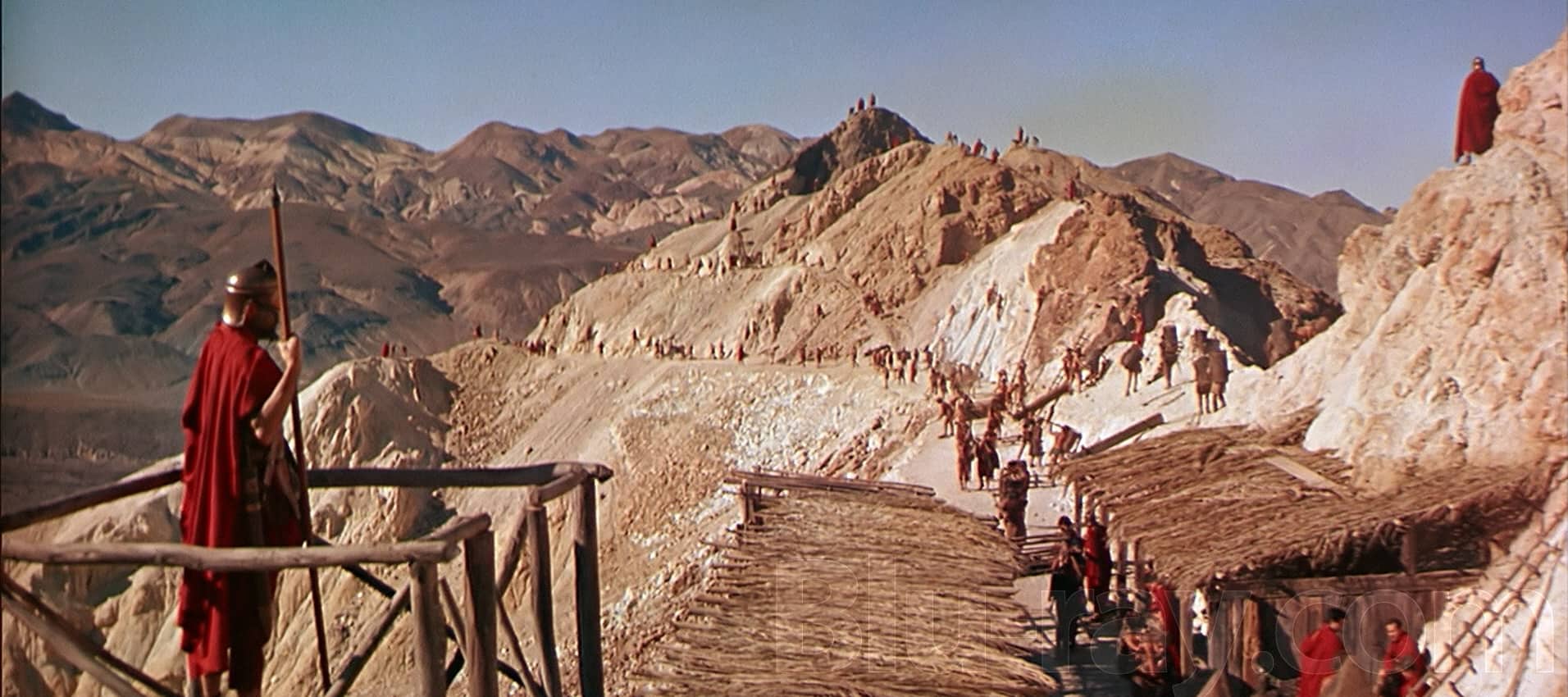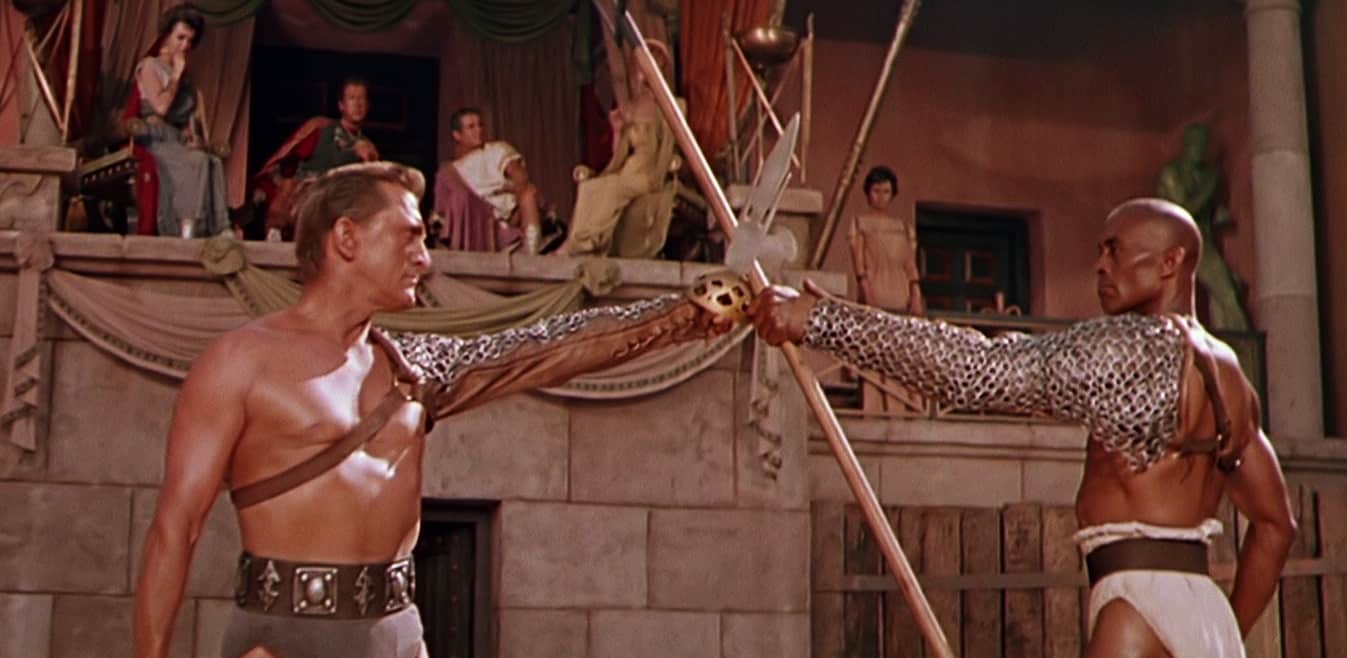There is a lot to sift through when it comes to Spartacus, before even getting to the film itself. There is the controversial credit bestowed to previously blacklisted screenwriter Dalton Trumbo. There is the firing of original director Anthony Mann about three weeks into the shoot (some say he asked to leave), followed by the subsequently hasty hiring of Stanley Kubrick over the course of a weekend. There is then the ensuing animosity between the obstinate Kubrick and the headstrong star/producer Kirk Douglas. Finally, there is the film’s placement in popular culture, with ubiquitous spoofs and spinoffs. If one is able to look beyond the noise of its tumultuous production, however, Spartacus remains one of the finest epics to ever emerge from the Hollywood studio system.
Available now on a newly remastered Blu-ray from Universal, this latest home video version of Spartacus is sourced from a 4K restoration and features a conversation with Douglas, a segment on the restoration process, and various holdovers from the prior Criterion Collection DVD, such as deleted scenes, behind-the-scenes footage, newsreels, interviews and more. Even with this restoration, though, the Criterion two-disc DVD is still the release to have.
Following credits created by the renowned Saul Bass, the film picks up in Lybia circa 73 BC. This is an era when Rome rules supreme, doing so on the backs of slaves. This, as the narrator states, is the “age of the dictator,” where men, like Spartacus (Douglas), have been “sold to living death.” Living, of course, being the ironically operative word. When we first see Spartacus, he instantly makes an impression by swiftly helping a fallen fellow slave, and in doing so shows an utter disregard for the valuable salt mine payload they both carry. When reprimanded by one of the Roman soldiers, Spartacus bites the man in the leg, a telling reaction. That he would instinctively chomp on the soldier before he would hit him clearly suggests that Spartacus, in this current state at least, is like a rabid animal, disheveled and carnal, thus setting up his transition into the more estimable leader to be all the more pronounced. When Batiatus (Peter Ustinov) arrives in search of a prospective acquisition, Spartacus is essentially purchased for this very defiance and ferocity. These opening sequences are the sole surviving scenes directed by Mann.
It is at the following gladiator school where the first inkling of classically Kubrickian themes become evident. While Trumbo wrote the screenplay based on Howard Fast’s novel (Fast himself a member of the “Hollywood Ten”), and Kubrick does not receive even uncredited script acknowledgment, familiar features synonymous with the director are nonetheless prevalent throughout Spartacus, primarily the dehumanization of man and the ongoing struggle between those in authority and those who defy the controlling powers. It is also at the school where Spartacus, but more importantly, Douglas, is now clean-shaven and groomed. It is easy to see why Douglas fought so hard for Spartacus. With (frequently bare) chest out and head high, this is the actor is in his prime as a chiseled powerhouse of ubermasculine bravado (Fast has actually questioned the casting of Douglas, labeling the actor an “exhibitionist”).
Through his confidence and natural leadership, Spartacus the soon to be rabble-rouser establishes an instant camaraderie with most of the men, establishing a permanent bond. He also proves to be a morally upstanding hero, as he refuses to defile the sex slave Varinia (Jean Simmons), with whom he instantly falls in love. Spartacus innately inspires devotion, so when the final straw of seeing his beloved whisked away creates a revolt in the mess hall, the result is a profound, if momentary, slave rebellion.
Easing into the leadership role, Spartacus assumes a position of authority and responsibility. Part of what distinguishes him is his capacity for cool, level headedness. He sees the big picture and wants the slaves to be more than just a ragtag group of drunken rebels; with all neighboring slaves free, there exists the potential for an army. The loyalty he inspires frustrates Crassus (Laurence Olivier), essentially Spartacus’ arch-nemesis, who later mocks the “myth of slave brotherhood.” The most illustrative example of this felloweship is, of course, the famous collective call of “I am Spartacus,” as all captured slaves stand up to protect their leader. Even though Spartacus is himself doomed, what he inspired lingers on, so it is therefore not enough for Crassus to abolish the man; he also wants to “kill the legend of Spartacus.” But this is not possible, and thus the film ends with what is a rather optimistic conclusion.
Against all of the above is the backdrop of Roman movers and shakers and the corresponding political upheaval of the time. This, along with the training procedures of the slave school, which Kubrick depicts in fascinating detail, and the warm communal freed slave encampments, are three sections of Spartacus that could warrant a decently interesting film in their own right. Assembled, they make the film one sprawling, multifaceted, three-hour-plus saga.
Beyond Douglas, this cast is one for the ages, boasting a roster of stars that include Olivier, Simmons, Ustinov, Charles Laughton, John Gavin, John Ireland, Tony Curtis, and Woody Strode. While Ustinov came away with the Oscar, it is Laughton who gives Douglas a run for his scene-chewing money. As the scheming, sleazy, and charismatically ruthless Gracchus, he is a captivatingly ambiguous antagonist.
Everything about Spartacus is extremely well arranged and presented. Russell Metty may have decried Kubrick’s obtrusiveness and oversight on what he considered to be “his” cinematography, but the sharply tuned imagery deservedly won an Oscar (presumably there were no complaints after that). As great as Spartacus looks, though, few scenes give the impression of Kubrick’s distinct style, save for a few observationally detached tracking shots, which are quite remarkable. Most astonishing, thanks to Kubrick’s pictorial sense of spectacle and Bass’ storyboard contributions, are the impressive wide shots of slaves making their way over the mountainside and the massive showdown between the slaves and the Roman army. To see this kind of scope, with thousands of real people, shot on 70mm Super Technirama, is quite a sight in this age of digitally produced locations and populations. Spartacus is also noteworthy for its considerably daring content, such as a fair amount of bloodshed (by 1960 standards) and the notorious homoerotic exchange between Crassus and Antoninus (Curtis), which was initially cut for the film’s theatrical release. Today, the encounter seems rather hackneyed, but that dialogue is priceless:
Crassus: Do you consider the eating of oysters to be moral and the eating of snails to be immoral?
Antoninus: No, master.
Crassus: Of course not. It is all a matter of taste, isn’t it?
Antoninus: Yes, master.
Crassus: And taste is not the same as appetite, and therefore not a question of morals.
Antoninus: It could be argued so, master.
Crassus: My taste includes both snails and oysters.
There is documented history about the real Spartacus and the period depicted in this film, but if one is watching a Hollywood epic for its historical accuracy, there is bound to be disappointment. Spartacus is far more enjoyable and engaging if one approaches it for the entertaining and inspiring, if occasionally hokey, show that it is. This is studio craftsmanship at its finest, with a number of famous faces, a rousing, Oscar-nominated score by Alex North, Oscar-winning costumes and sets, and the finances to give it all a pronounced polish. True, for most Kubrick admirers the film is bittersweet and ranks low in the master’s canon. But if this is Kubrick when he was not totally immersed in a project and lacked his requisite control, it does a good deal to explain why his more personal movies are the exceptional works that they are. Even second-rate Kubrick is still first-rate filmmaking.






No comments:
Post a Comment